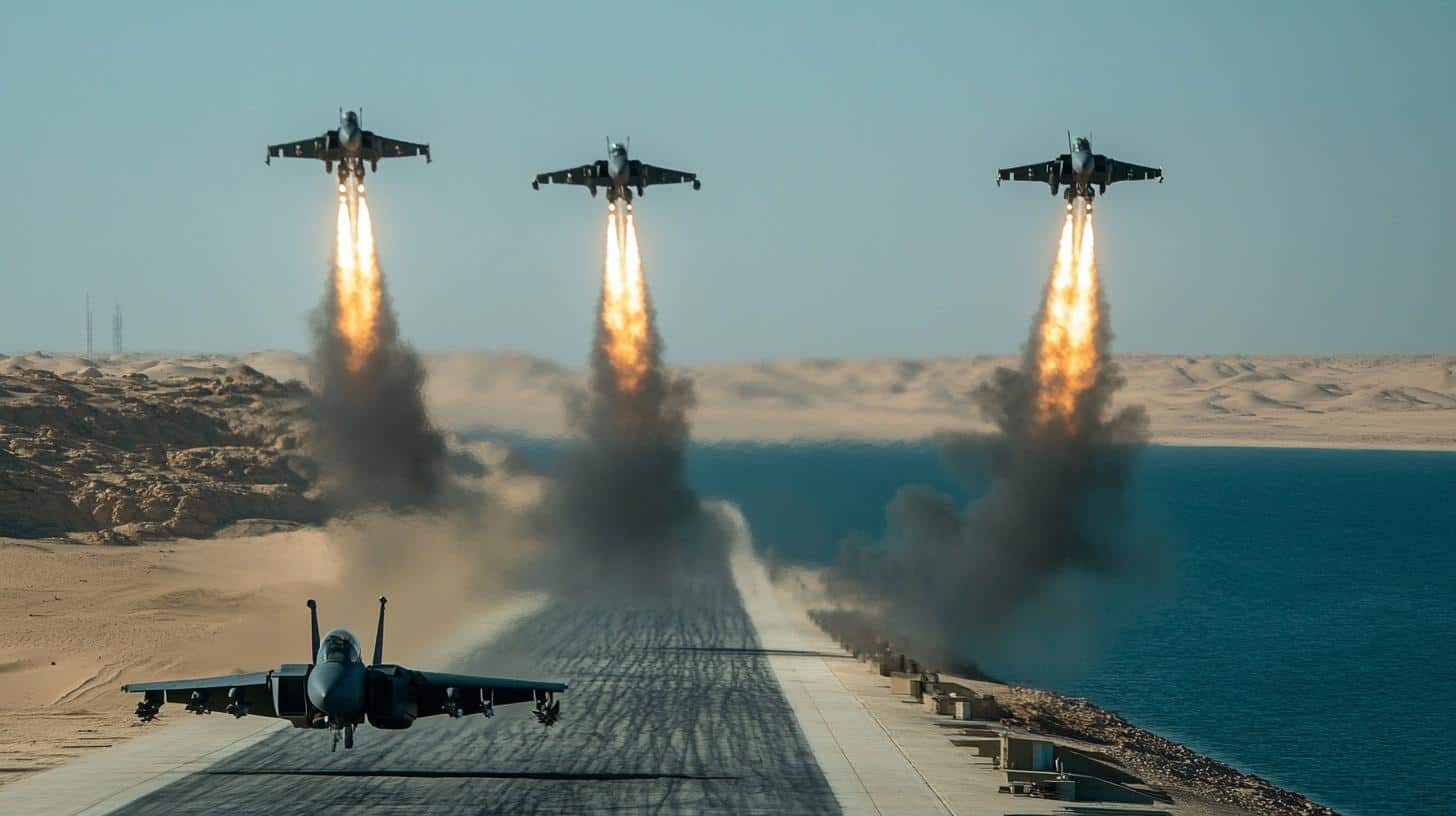In response to escalating tensions in the Middle East, the United States has strategically stationed a squadron of F-15 Strike Eagles in anticipation of Iran’s projected strike against Israel. These advanced jet fighters are headed to Jordan, a pivotal partner in maintaining regional balance.
This development takes place against the backdrop of Israel’s Defense Ministry concluding a substantial $5.2 billion agreement. The contract, secured with U.S. military funding, involves acquiring 25 cutting-edge F-15 jets to reinforce Israel’s air strength. These jets, manufactured by Boeing, will be delivered incrementally starting in 2031, with the possibility of purchasing an additional 25 units.
Alongside these announcements, the U.S. has intensified its military presence in the region. Orders have been issued for deploying several B-52 heavy bombers, in addition to tanker aircraft and Navy destroyers. The formidable B-52s, known for their long-range and nuclear capabilities, have previously played crucial roles in deterring conflicts in the area.
Furthermore, America is upgrading its missile defense by deploying its advanced Terminal High-Altitude Area Defense (THAAD) system. These measures align with recent warnings from Tehran, which has threatened a complex response after suffering significant losses from Israel’s retaliatory actions.
Amid these tension-fueled moves, reports suggest that Tehran’s next military maneuver aligns strategically with the U.S. presidential election season, indicating the possibility of an imminent Iranian assault. Arab and Iranian officials have indicated that the forthcoming attack is poised to be even more severe than Tehran’s previous strike, which involved a volley of 200 ballistic missiles against Israel.
The Hidden Ripple Effects of Middle Eastern Military Tensions: How Communities Worldwide Could Feel the Impact
In light of recent developments in the Middle East, significant attention has been focused on the strategic deployment of U.S. military assets to counter potential threats from Iran. This situation isn’t just about tactical maneuvers or military assets; it has broader implications for people, communities, and nations around the globe. Let’s explore some lesser-known aspects of this tense standoff, including its far-reaching impacts, intriguing facts, and the controversies that surround it.
The Economic Consequences of Military Escalation
Military buildups and geopolitical tensions typically send ripples through global markets. As the U.S. stations F-15 Strike Eagles and deploys B-52 bombers in anticipation of Iranian aggression against Israel, oil prices can rise sharply due to perceived risks of conflict in the oil-rich Middle East. This can increase the cost of living worldwide, affecting everything from the price of gasoline to the cost of goods, largely due to higher transportation costs.
Influence on Global Diplomacy and Alliances
The Middle East is a theater where strategic alliances are constantly tested. Jordan’s role in hosting U.S. F-15s reinforces its position as a vital U.S. ally, affecting its diplomatic relations with neighboring countries. This nuanced balance can lead to shifts in regional power dynamics, forcing countries to realign their foreign policies. For smaller nations, choosing a side could mean the difference between receiving ample international aid or facing economic sanctions.
Humanitarian Concerns and Refugee Crises
Escalating threats and military build-ups could exacerbate humanitarian issues. As tensions rise, potential conflicts could displace thousands, if not millions, of civilians, leading to increased refugee flows. Host countries may struggle to accommodate new arrivals without sufficient infrastructure or international assistance. These circumstances put immense pressure on humanitarian organizations to bridge the gap between growing needs and available resources.
Technological Advancements Versus Ethical Dilemmas
While the F-15s and THAAD systems represent cutting-edge technology, they also spark debates about the ethics of such advancements. These technologies are praised for their ability to deter conflict and protect lives, yet their presence may catalyze arms races, pushing nations towards excessive militarization. Additionally, the deployment of such advanced weaponry raises questions about military transparency and accountability.
Social Impact of Defence Contracts
The $5.2 billion deal for Israel’s F-15 jets, while strengthening Israel’s air capabilities, influences domestic politics. In countries like the U.S., where military funding affects taxpayer contributions, citizens often debate the allocation of resources towards foreign military aid instead of domestic priorities such as healthcare or education.
Questions to Ponder
– How do military buildups affect global economic stability, and who benefits or suffers the most?
– What are the ramifications for regional diplomacy when countries strengthen military alliances?
– Are advanced military technologies catalysts for peace or conflict?
Advantages and Disadvantages to Consider
An increase in military preparedness can serve as a deterrent to aggression, potentially maintaining global security. However, the financial drain on national resources, coupled with the humanitarian toll of potential conflicts, presents significant disadvantages. Furthermore, the ethics of advanced military tech and the social implications of defense spending add complexity to the conversation.
For further exploration of global military dynamics, geopolitical tensions, and their broader impacts, visit these links:
– Global Issues
– Council on Foreign Relations
– Brookings Institution
These complexities remind us that military actions have implications far beyond the immediate region, affecting lives and shaping societies worldwide. Understanding both the benefits and potential pitfalls is essential as the global community navigates these turbulent times.







